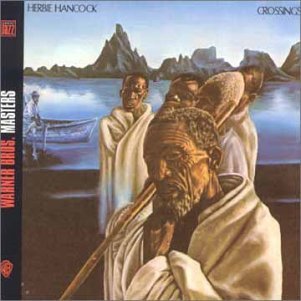Crossings (Herbie Hancock album)
1972 studio album by Herbie Hancock From Wikipedia, the free encyclopedia
Crossings is the tenth album by jazz pianist Herbie Hancock, released in 1972.
| Crossings | ||||
|---|---|---|---|---|
 | ||||
| Studio album by | ||||
| Released | May 1972[1] | |||
| Recorded | February 15–17, 1972 | |||
| Studio |
| |||
| Genre | Avant-garde jazz, jazz fusion | |||
| Length | 46:21 | |||
| Label | Warner Bros. | |||
| Producer | David Rubinson | |||
| Herbie Hancock chronology | ||||
| ||||
| Review scores | |
|---|---|
| Source | Rating |
| Allmusic | |
| The Rolling Stone Jazz Record Guide | |
| The Penguin Guide to Jazz Recordings | |
It is the second album in his Mwandishi period, which saw him experimenting in electronics and funk with a sextet featuring saxophonist Bennie Maupin, trumpeter Eddie Henderson, trombonist Julian Priester, bassist Buster Williams and drummer Billy Hart. The album is the band's first to feature synthesizer player Patrick Gleeson, originally hired as a technician to help set up Hancock's Moog synthesizer; Hancock was so impressed with Gleeson that he "asked Gleeson not only to do the overdubs on the album but join the group."[5]
Crossings, along with Fat Albert Rotunda and Mwandishi, was reissued in one set as Mwandishi: The Complete Warner Bros. Recordings in 1994 and as The Warner Bros. Years (1969-1972) in 2014.
Track listing
| No. | Title | Writer(s) | Length |
|---|---|---|---|
| 1. | "Sleeping Giant" | Herbie Hancock | 24:38 |
| Total length: | 24:38 | ||
| No. | Title | Writer(s) | Length |
|---|---|---|---|
| 2. | "Quasar" | Bennie Maupin | 7:27 |
| 3. | "Water Torture" | Maupin | 14:04 |
| Total length: | 21:21 | ||
Personnel
- Herbie Hancock – piano, electric piano, mellotron, percussion
- Eddie Henderson – trumpet, flugelhorn, percussion
- Bennie Maupin – soprano saxophone, alto flute, bass clarinet, piccolo, percussion
- Julian Priester – tenor and alto trombones, bass, percussion
- Buster Williams – bass guitar, double bass, percussion
- Billy Hart – drums, percussion
With:
- Patrick Gleeson – Moog synthesizer, Mellotron[6]
- Victor Pantoja – congas
- Candy Love, Sandra Stevens, Della Horne, Victoria Domagalski, Scott Beach – voices
References
Wikiwand - on
Seamless Wikipedia browsing. On steroids.
